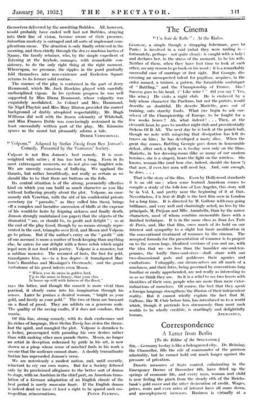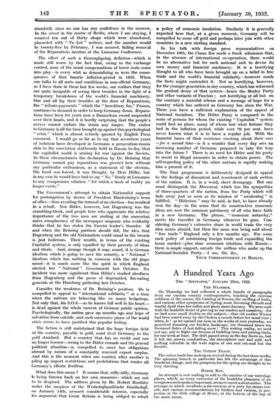Correspondence
A Letter from Berlin
[To the Editor of the SPECTATOR.] SIR,—Germany to-day is like a beleaguered city. Dr. Beating, the Chancellor, fills the role of commander of the garrison admirably, but he cannot hold out much longer against the pressure of privation.
Drastic measures of State control, culminating in the Emergency Decree of December Stir, have dried up the springs of economic life, and every man, woman and child is now feeling the pinch from the steady ebb of the Reichs- bank's gold cover and the utter desiccation of credit. Wages, prices, rents and even rates of interest have all come down, and unemployment increases. Business is virtually at a
standstill, since no one has any confidence in the morrow. In the street in the centre of Berlin, where I am staying, I counted ten out of thirty shops which were abandoned, placarded with " To Let " notices, and the number would be twenty-five by February, I was assured, failing removal of the Reparations incubus at the Lausanne Conference.
The effect of such a thoroughgoing deflation—which is made still worse by the fact that, owing to the exchange control, none of the usual compensations of lower costs come into play—is every whit as demoralizing as were the conse- quences of that lunatic inflation-period in 1923. When one talks to all sorts and conditions in non-official Germany, as I have done in these last few weeks, one realizes that they are quite incapable of seeing their troubles in the light of a temporary breakdown of the world's financial machinery. One and all lay their troubles at the door of Reparations, the " tribute-payments " which the " hereditary foe," France, continues to demand in order to keep Germany down. Repara- tions have been for years now a Damoclean sword suspended over their heads, and it is hardly surprising that the people's nerves cannot endure the strain any longer. The visitor to Germany is all the time brought up against this psychological crisis " which is almost entirely ignored by English Press comment. I would go so far as to say that seventeen years of isolation have developed in Germans a persecution-mania akin to the conviction stubbornly held in Russia to-day that the capitalist world is arming for war against the Soviets. In these circumstances the declaration by Dr. Bruning that Germany cannot pay reparations was greeted here without any particular enthusiasm, as a statement of the obvious. His hand was forced, it was thought, by Herr Hitler, but in any case he would have had to say " firmly at Lausanne to any compromise solution " for which a basis of reality no longer exists."
The Government's attempt to obtain Nationalist support for prolongation by decree of President Hindenburg's term of office—thus avoiding the turmoil of an election—has resulted in a rebuff. Not Hitler, however, but Hugenberg was the stumbling-block, and people here who appreciate the relative importance of the two men are smiling at the somewhat naive complacency of the newspaper magnate who evidently thinks that he has stolen the Fascist leader's thunder. If and when the Bruning garrison should fall, the idea that Hugenberg and the old Nationalists could stand in the breach is just ludicrous. Their wealth, in terns of the existing Capitalist system, is only equalled by their poverty of ideas and ideals. And, strange though it may sound, it is German idealism which is going to save the country, a " National " idealism which has nothing in common with the old jingo mood—it is much more like the spirit in which England elected her " National " Government last October. No incident was more significant than Hitler's studied aloofness from Hugenberg and the posse of disgruntled, fire-eating generals at the Harzburg gathering last October.
Consider the weakness of Dr. Brfining's position. He is compelled to appeal to " international solidarity " at a time when the nations are behaving like so many hedgehogs. Not only that, his S.O.S.—as he knows full well in his heart— is dead against the whole current of German public opinion. Psychologically, the nation gave up months ago any hope of salvation from outside, and each successive phase of the world crisis seems to have justified this popular feeling.
The fiction is still maintained that the huge foreign debt of the country, payable in gold, must rivet Germany to the" gold standard. But a country that has no credit and can no longer borrow—owing to the Hitler crusade and the general political situation—is compelled to meet her obligations abroad by means of a constantly renewed export surplus. And this is the moment when one country after another is piling up import restrictions and prohibitions that render all Germany's efforts fruitless.
What does this mean ? It means that, willy-nilly, Germany is being thrown back on her own resources—which are not to he despised. The address given by Mr. Robert Boothby under the auspices of the Wirtschaftspolitische gkselfschaff, on January 14th, aroused considerable interest, especially his argument that Great Britain is being obliged to adopt
a policy of economic insulation. Similarly it is generally expected here that, at a given moment, Germany will be compelled to come off gold and perhaps later join with other countries in a new sterling standard.
In his talk with foreign press representatives on December 10th, the Chanc llor made a frank admission that, in the absence of international co-operation, there would be no alternative but for each national unit to devise its own money and financial machinery. It is a horrifying thought to all who have been brought up on a belief in free trade and the world's financial solidarity—however much the facts might contradict it. Not so horrifying, however, for the younger generation in any country, which has witnessed the gradual decay of that system—hence the Mosley Party and other variants of Fascism ; not horrifying at all but on the contrary a merciful release and a message of hope for a country which has suffered as Germany has since the War. There you have a sufficient explanation of the appeal of National Socialism. The Hitler Party is composed in the main of persons for whom the existing " Capitalist " system could find no place, many of whom lost what fortune they had in the inflation period, while over 70 per cent. have never known what it is to have a regular job. With the financial bases of their existence crashing about their ears for a second time—is it a wonder that every day sees an increasing number of Germans prepared to take the leap into the future ? There is no need for Hitler and his party to resort to illegal measures in order to obtain power. The self-regarding policy of the other nations is rapidly making him a present of it.
The Nazi programme is deliberately designed to appeal to the feelings of discontent and resentment of each section of the nation. It is, in a word, sheer demagogy. But one must distinguish the Movement, which has the sympathies of three-quarters of the nation, from the Party which will fade away just as soon as its mission of " awakening " is fulfilled. " Hitlerism " may be said, in fact, to have already won the day—in the sense that its constructive economic ideas are now the common patrimony of all who have faith in a new Germany. The phrase, " economic autarchy," meets the traveller in Germany wherever he goes. Con- sidering Germany's extensive share in world trade the very idea seems absurd, but then the same was being said about " free trade " England only a few months ago. For some such policy of minimizing foreign trade and expanding the home market—plus close economic relations with Russia— there is ample support, outside the million who make up the National-Socialist Party.—I am, Sir, &c.,
YOUR CORRESPONDENT IN BERLIN.





































 Previous page
Previous page